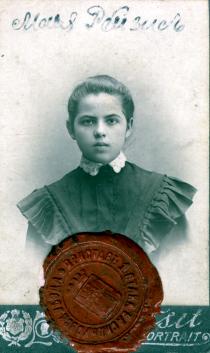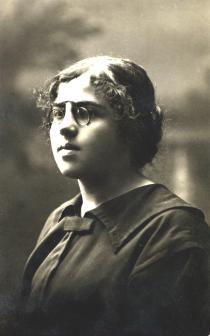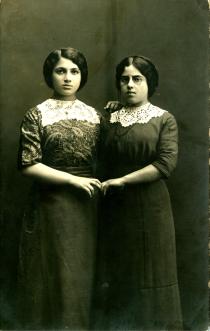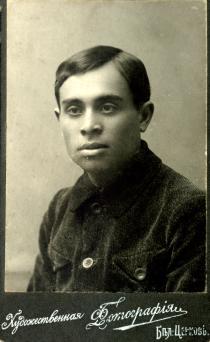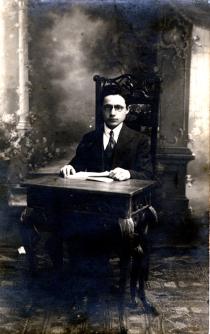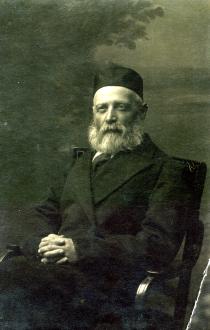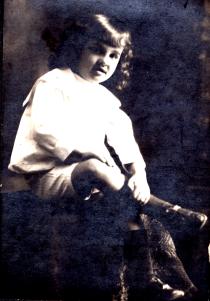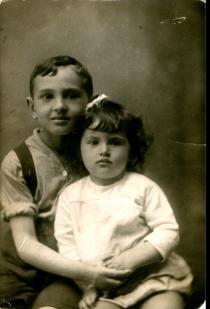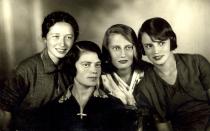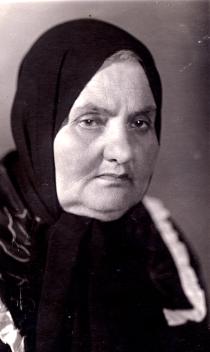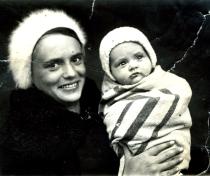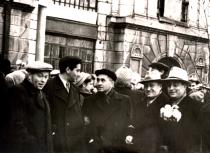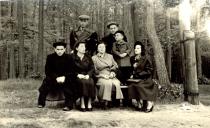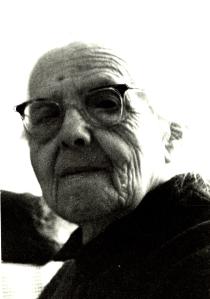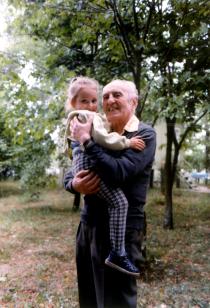This is my father, Peisach Dubinski. He decided to send this photo to his father in America. It was taken in studio 'Khudozhestvennaya Photography' in Belaya Tserkov, 1914.
My father, Peisach Dubinski was born in Taborov in 1893. At the time his father Srul Simcha was a stableman for countess Branitskaya and the family lived near the mansion in the vicinity of Taborov. My father went to a parish school [Christian Orthodox school]. Cheder was located at a long distance from home and for this reason my father's parents sent him to the parish school. My father said that his schoolmates teased him a lot and there was anti-Semitic attitude. He was the only Jewish boy at school. Ukrainian boys were fair-haired snub-nosed boys while my father had a typical Semitic appearance: brunette with a big nose. Besides, he spoke Ukrainian with a strong Jewish accent that also resulted in a lot of teasing. However, one teacher stood for him. At religion classes the priest held up my father as an example 'Look, although this is a Jewish boy he knows Christian prayers best of all of you'. My father attended Christian lessons since it was mandatory for all pupils to attend all classes. He knew Christian prayers best among all other pupils. My father studied successfully at school and manager of the estate in Taborov hired him to teach his son. After finishing the parish school where he studied 4 years my father went to work in a hardware store. He told us that he lived in an attic. He was eager to study and read, but he didn't get a chance to continue his education.
In 1914 when World War I began my father's older brother Iosif was recruited to the army. He took part in the war and was captured. I don't know in what captivity he was. At the beginning of World War I the Pale of Settlement was abolished and Jews began moving to bigger towns. The Jewish population in Kiev increased significantly. My great-grandfather Dubinski, grandmother Sarra and her sons also moved to Kiev from Taborov. The family rented an apartment in Basseynaya Street in Kiev. My father and his brothers went to work as shop assistants in an hardware store.
Shortly afterward my father met Maria Reizis, a Jewish girl from Belaya Tserkov. The Reizis family also moved to Kiev after the Pale of Settlement was abolished. They rented an apartment in the center of the town. My parents got married in 1916. They had a Jewish wedding. They installed a chuppah in the yard of the house where Maria lived. The ceremony was conducted by a rabbi from Brodski synagogue. The newly weds settled down in the Maria parents' apartment. We lived in a 4-storied house on the corner of Prozorovskaya and Saksaganskogo Streets in the very center of the city. There were Jewish, Ukrainian, Russian and Polish tenants. My parents were always busy and I spent much time outside playing with other children. We didn't care about nationality. My parents spoke Yiddish at home, particularly, when they were arguing and didn't want us to understand the subject of their discussion. They spoke Russian to Maria and me. My parents spoke Yiddish until the end of their days. My father and mother read many Russian books: they were particularly fond of Russian classics Gorky and Gogol. They spoke fluent Russian.
My parents were raised in religious families, but they were not religious themselves. They thought there was too much suffering in life and if God existed he wouldn't allow things to happen. They attended synagogue when they were children, but, as my father and mother stated it was a 'childish faith'. My parents didn't observe Jewish traditions. I remember my mother eating brown bread at Pesach - she liked it. She always asked Maria and me 'Please, don't tell your grandmother or grandfather that I've eaten brown bread'. And we kept it a secret. My father liked pork fat and cracklings very much. His breakfast consisted of brown bread with cracklings that he liked through his life. This is the way I remember my parents, but I don't know whether they had different habits before.
My father was an assistant accountant in a trade association. My mother was a housewife. She spent a lot of her time in the kitchen and I heard her singing there. She sang Soviet popular songs, but I don't remember her singing Jewish songs.

